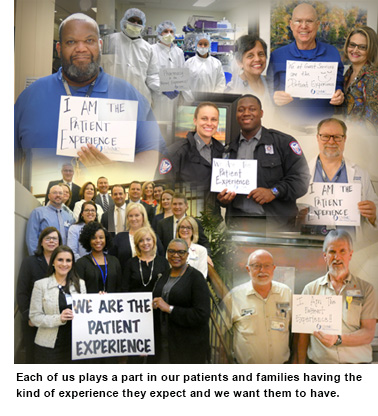You Are the Patient Experience
Good morning!
Before I dive into today’s topic, I wanted to make you aware of an unusual opportunity to support our Children’s of Mississippi building project. An anonymous donor has issued a challenge that any donation to the project between now and Tuesday, April 30, which our Development staff has dubbed “Giving TWOsday,” will be matched, up to a total of $250,000. That’s an opportunity to double the impact of your contribution! You can learn more about this opportunity here.
 It’s not unusual for me to receive comments from patients or members of their family about their experience at our UMMC hospitals and clinics. Some of these are from personal friends of mine. Some are shared with me by colleagues. And some come from you as comments in my VC Notes inbox.
It’s not unusual for me to receive comments from patients or members of their family about their experience at our UMMC hospitals and clinics. Some of these are from personal friends of mine. Some are shared with me by colleagues. And some come from you as comments in my VC Notes inbox.
A few of the comments are critical, and I welcome them because they provide opportunities to improve. But most are along the lines of these recently shared with me:
“At every stop I made from the ED to my hospital room, the nurses were just exceptional, so caring and kind.”
“The housekeeping staff cleaned my room every day, and then an enthusiastic young lady with a clipboard came through and asked me if the cleanliness of the room was to my satisfaction. I was surprised and impressed!”
“They helped save my husband’s life and they did it with love and compassion, dedication and just pure mind-numbing research and know-how.”
“This hospital is truly on its way to being the best.”
These are the voices of our patients or their loved ones, and what they are describing is the patient experience.
And I have to say that based on comments like these, my own observations and results of surveys, the patient experience is improving at UMMC. Our teamwork is better. Our quality metrics continue to improve. Our communication – with patients and families and with each other – is on the upswing. We are making it clear to patients that we care about them, the quality and safety of the medical care they receive, and how they are treated – with attention, respect and compassion.
I see signs of this change at the most basic level – our adoption of a culture of quality – and I am so proud of the work that has gone into this. The work of our clinical quality experts, our clinical leaders and managers, our frontline caregiving staff, our support staff. I’m proud of our whole UMMC team.
The fact is, every one of us shapes our patients’ experience – from the time they are referred and scheduled to their arrival on campus to the physical appearance of the place to the way they are acknowledged and assisted in the hallways to how the food tastes, and on and on. There are a thousand ways in each patient’s visit for us to leave an impression – good or bad.
I see real progress in this area. But I hasten to add – and you knew this was coming – we are not there yet. We have too much variability from unit to unit. Surveys of patients indicate that some of our units are very strong when it comes to their experience – in the 90th percentile. Others are considerably lower. Even though no two units are alike or have the same challenges, we need to export best practices from our higher-performing units to our lower-performing ones. And we are.
It’s important that we measure our progress through patient surveys. As is often said, you can’t improve what you don’t measure. Beyond that, survey results affect our reputation as reported by CMS and others, and they impact the level of reimbursement we receive from Medicare. Most important, though, surveys represent the “voice of the patient,” and we should honor and respect what they are telling us, even if what they are saying isn’t flattering.
The bottom line: We are ALL the patient experience. Each of us owns a piece of it. It’s up to us to make sure these pieces connect in a coherent experience that doesn’t just meet the patient’s expectations, but exceeds them in ways that are pleasantly memorable. For an inspiring peek at what I’m talking about, take a look at this short video produced by the Beryl Institute.
When we consider our patients’ experience from their perspective, and how we would want to be treated under the same circumstances, it can guide us on the path we’re taking toward higher reliability and A Healthier Mississippi.



